 A Pennsylvania Photo ID law that one Republican lawmaker once boasted would deliver the Keystone State to Mitt Romney in the 2012 Presidential Election was struck down by a Pennsylvania trial court.
A Pennsylvania Photo ID law that one Republican lawmaker once boasted would deliver the Keystone State to Mitt Romney in the 2012 Presidential Election was struck down by a Pennsylvania trial court.
Judge Bernard L. McGinley of the Commonwealth Court of Pennsylvania ruled that several sections of Act 18, the Republican-sponsored polling place Photo ID statute that was signed into law by Gov. Tom Corbett (R) in March of 2012, violated the Pennsylvania Constitution. The court, which previously prevented the law from taking effect by the issuance of a preliminary injunction, ordered that Act 18's in-person Photo ID requirement be permanently enjoined.
That ruling does not come as a surprise.
In May of 2012, The BRAD BLOG predicted that the plaintiffs in Applewhite vs Commonwealth of Pennsylvania would likely establish that Act 18's polling place Photo ID restrictions violate of that state's constitution. The lawsuit --- named after its 93-year old lead plaintiff Vivian Applewhite, who had voted for 50 years without a problem until 2012 --- alleged that the Act's Photo ID restrictions would deny or significantly impair the right to vote. That right, according to the Keystone State's constitution, is considered "fundamental."
Under judicially recognized Equal Protection standards, a law that impairs or abridges a "fundamental right" cannot survive a constitutional challenge unless the law is narrowly tailored to serve a "compelling state interest." That interest, we observed in our original article, cannot be found in what amounts to the "phantom menace" of in-person voter impersonation --- a point PA Republicans later conceded via a formal, in-court stipulation, entered near the outset of the case, in which they acknowledged they were "not aware of any incidents of in-person voter fraud in Pennsylvania and do not have direct personal knowledge of in-person voter fraud elsewhere."
While he included additional reasons for issuing the permanent injunction, Judge McGinley's lengthy decision [PDF] reveals that our original assessment of the case, and our prediction about its likely outcome, were spot on...
Unconstitutional
The court ruled that the polling place Photo ID provisions of Act 18 impose "burdens on the fundamental right to vote, which are unreasonable and are not narrowly tailored to serve a state interest." The law "does not provide a non-burdensome means for accessing compliant photo ID." Instead, the judge found, "its requirements effectively deny, delay and inconvenience exercise of the franchise [to hundreds of thousands of otherwise eligible voters]."
The court expressly ruled that the Commonwealth had failed to "substantiate either voter fraud or integrity in elections...as a compelling or legitimate state interest for the Voter ID Law."
In its decision, the court cited the expert testimony offered by Rutgers University Prof. Lorraine Minnite, Ph.D.: "The only type of voter fraud that the Voter ID Law could detect, deter, or otherwise address is [the exceptionally rare instances of] in-person impersonation fraud, whereby a person appears at a polling place and attempts to vote for another person," the court stated in referring to Minnite's testimony.
The court found that the Commonwealth's stipulation that they were "not aware of any incidents of in-person voter fraud in Pennsylvania" served only to "undermine" its claim that the statute was intended to prevent voter fraud.
Act 18's polling place Photo ID restrictions did not, in fact, serve to bolster the integrity of elections, as the state had argued. To the contrary, the court expressly found that the Commonwealth's "implementation of the Voter ID law in a manner that disenfranchises qualified electors will undermine the integrity of elections."
The court summed up its findings in the conclusions of law section of its decision:
Respondent's stipulation shows voter fraud is not a state interest for the Voter ID Law; the sole interest Respondents put forth is electoral integrity, which was undermined by the credited testimony…
While the record established that the Act had a disproportionate adverse impact upon senior citizens and minorities and that "hundreds of thousands of registered voters in Pennsylvania" lacked the requisite Photo ID, "denying eligible voters the franchise is unconstitutional, regardless of the number of voters who are so deprived," Judge McGinley opined, citing Pennsylvania case law establishing that the "disenfranchisement of even one person validly exercising his right to vote is an extremely serious matter."
'Voter ID' still required, but not strict state-issued Photo ID
Judge McGinley's injunction only applies to "the enforcement of the in-person photo ID requirement, [to the] related implementation provisions [of the Act] and application of the proof of identification definition as to in-person voting."
As the court recited at the outset, prior to the enactment of these disputed Photo ID provisions, the Commonwealth's election law statute already "permitted electors to present one of several specified forms of non-photo ID that contained the elector's name and address, including a utility bill, paycheck, or government check…These forms of identification mirror those listed in the Help America Vote Act (HAVA)."
The majority of states in this country already require similar identification for in-person voting. It is only within the last few years that Republicans began restricting those forms to a narrow number of state-issued, Photo IDs.
The PA ruling does not eliminate the state's existing non-Photo ID requirements. It also does not affect any changes to absentee ballot law that were made by other sections of Act 18. Those other sections were not challenged by the Applewhite plaintiffs.
Potential Impact in Other States
Judge McGinley's application of strict scrutiny to a Photo ID law by reason of a state constitution that treats voting as a "fundamental right" is by no means novel. In Weinschenk v. State (2006), the Missouri Supreme Court struck down the Show Me State's polling place Photo ID law on identical grounds. A similar rationale was applied by Wisconsin courts in temporarily enjoining the Badger State's Photo ID law. Two of those Wisconsin cases are now pending before the Wisconsin Supreme Court.
As we anticipated some time ago, Judge McGinley ruled that the controversial U.S. Supreme Court decision in Crawford vs. Marion County Elections Board (2008) was not controlling in this matter because Crawford did not involve a legal challenge to a Photo ID law pursuant to a state constitution that treated voting as a fundamental right. Instead, the petitioners in Crawford unsuccessfully argued that Indiana's Photo ID law, "on its face," violated the U.S. Constitution. Because voting is not treated as a "fundamental right" under the federal constitution, Judge McGinley observed, "the U.S. Supreme Court applied a rational basis test" --- as opposed to the near insurmountable hurdle of "strict scrutiny" that applied in this instance.
However, Judge McGinley also observed that the Indiana Photo ID statute withstood the federal legal challenge because "there was insufficient evidence to indicate de facto disenfranchisement of qualified voters whereas the record [in Applewhite] shows hundreds of thousands lack compliant photo ID." Where the Supreme Court's decision, in Crawford, "revealed 'nothing about the number of free photo identification cards issued since' Indiana's Voter ID law was enacted...the developed record here shows the gap in access to photo identification is not being filled." While "hundreds of thousands...lack compliant photo ID," in Pennsylvania, only "17,000 photo IDs for voting purposes have been issued" since the law was passed in March 2012. The Nation's Ari Berman notes that "Since the 2012 election, fewer than 150 new voting IDs had been issued by the state per month."
This fact-driven decision in Applewhite is especially relevant with respect to the currently pending challenges to polling place Photo ID restrictions in jurisdictions like Texas, where a unanimous, three-judge U.S. District Court panel in 2012 found far greater impediments to the exercise of the franchise than exist in Pennsylvania. The Texas polling place Photo ID law would, in some cases, as the federal three-judge panel found, require the working poor, who lacked either a driver's license or sufficient means of transportation, to make a 200 to 250 mile round trip journey to the nearest Department of Public Safety [DPS] office, and face up to three hours wait time to secure a Photo ID --- this assuming the otherwise qualified voter has the requisite documentation, such as a birth certificate or marriage license required to navigate the restrictive provisions of the Lone Star State's regressive Photo ID requirements.
In addition to the pending federal court challenge against the Texas Photo ID law, which argues that their statute is in violation of the U.S. Constitution, federal challenges are also now pending against similar polling place restrictions enacted by Republicans in both North Carolina and Wisconsin.
Republican options
Even if an appeal is taken and the Pennsylvania Supreme Court were to uphold Judge McGinley's decision, this does not necessarily spell an end to Republican efforts to enact polling place Photo ID in the Keystone State.
In Missouri, the Republican-controlled legislature attempted to bypass a state Supreme Court ruling that struck down its Photo ID statute by way of a ballot measure that would have mandated otherwise disenfranchising Photo ID restrictions by way of an amendment to the Missouri constitution. The measure, the "Voter Protection Act," was removed from the ballot after a Circuit Judge essentially agreed with a senior attorney for the Advancement Project that the ballot measure amounted to a "cynical and shameful [effort to use] the voting process itself to trick voters into giving up their right [to vote]."
As we reported in "MN Voters See Through ‘Voter Fraud’ Lie, Defeat Polling Place Photo ID Amendment", a Republican effort to adopt Photo ID restrictions via a deceptive ballot measure fell short when Minnesota voters rejected the proposed amendment to that state's constitution by a decisive margin of 54% to 46%.
In Pennsylvania, amendments to the state's constitution can be placed on the ballot if approved by a simple majority of the legislature in two successive sessions.


 A Pretty Weak 'Strongman': 'BradCast' 10/30/25
A Pretty Weak 'Strongman': 'BradCast' 10/30/25 'Green News Report' 10/30/25
'Green News Report' 10/30/25
 Proposal for 'First Politically Viable Wealth Tax' Takes Shape in CA: 'BradCast' 10/29/25
Proposal for 'First Politically Viable Wealth Tax' Takes Shape in CA: 'BradCast' 10/29/25 Monster Storm, Endless Wars, Gamed Elections:
Monster Storm, Endless Wars, Gamed Elections: 'Green News Report' 10/28/25
'Green News Report' 10/28/25 Let's Play 'Who Wants
Let's Play 'Who Wants Sunday 'Cartoonists Dilemma' Toons
Sunday 'Cartoonists Dilemma' Toons Exiled NOAA Scientists Resurrect Critical Disaster Database: 'BradCast' 10/23/25
Exiled NOAA Scientists Resurrect Critical Disaster Database: 'BradCast' 10/23/25  'Green News Report' 10/23/25
'Green News Report' 10/23/25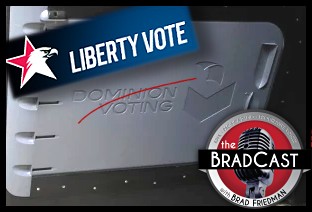 Trump-Allied GOP Partisan Buys Dominion Voting Systems: 'BradCast' 10/22/25
Trump-Allied GOP Partisan Buys Dominion Voting Systems: 'BradCast' 10/22/25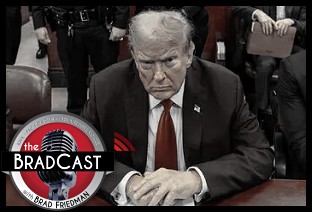 Trump, Republican Law(lessness) & (Dis)Order: 'BradCast' 10/21/25
Trump, Republican Law(lessness) & (Dis)Order: 'BradCast' 10/21/25 'Green News Report' 10/21/25
'Green News Report' 10/21/25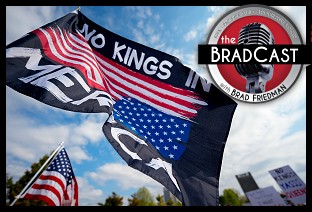 Celebrating 'No Kings': 'BradCast' 10/20/25
Celebrating 'No Kings': 'BradCast' 10/20/25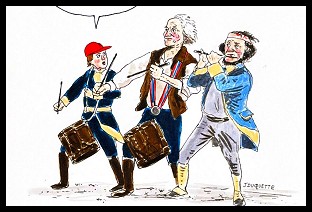 Sunday 'How It Started' Toons
Sunday 'How It Started' Toons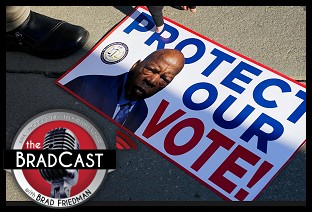 SCOTUS Repubs Appear Ready to Gut Rest of Voting Rights Act: 'BradCast' 10/16/25
SCOTUS Repubs Appear Ready to Gut Rest of Voting Rights Act: 'BradCast' 10/16/25 'Green News Report' 10/16/25
'Green News Report' 10/16/25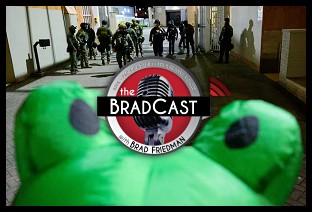 The 'Epstein Shutdown' and Other Autocratic Nightmares: 'BradCast' 10/15/25
The 'Epstein Shutdown' and Other Autocratic Nightmares: 'BradCast' 10/15/25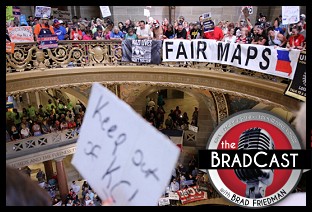 Group Vows to Block MO's GOP U.S. House Gerrymander: 'BradCast' 10/14/25
Group Vows to Block MO's GOP U.S. House Gerrymander: 'BradCast' 10/14/25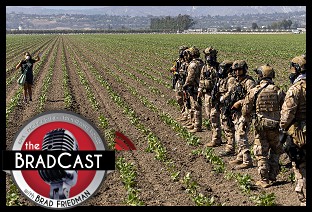 Trump Labor Dept. Warns Trump Policies Sparking Food Crisis: 'BradCast' 10/9/25
Trump Labor Dept. Warns Trump Policies Sparking Food Crisis: 'BradCast' 10/9/25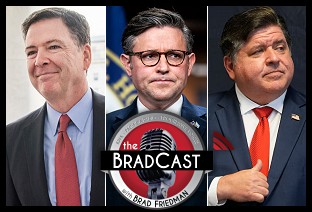 Trump's Losing Battles: 'BradCast' 10/8/25
Trump's Losing Battles: 'BradCast' 10/8/25 Trump, Roberts and His Stacked, Packed and Captured SCOTUS: 'BradCast' 10/7/25
Trump, Roberts and His Stacked, Packed and Captured SCOTUS: 'BradCast' 10/7/25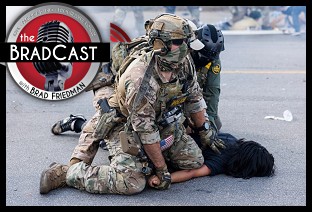 Trump Attempting His 'Invasion from Within': 'BradCast' 10/6/25
Trump Attempting His 'Invasion from Within': 'BradCast' 10/6/25 Biden Budget Expert: Mass Firings in Shutdown 'Illegal': 'BradCast' 10/2/25
Biden Budget Expert: Mass Firings in Shutdown 'Illegal': 'BradCast' 10/2/25 Why is DOJ Suing 'Blue' States for Their Voter Databases?: 'BradCast' 10/1/25
Why is DOJ Suing 'Blue' States for Their Voter Databases?: 'BradCast' 10/1/25
 VA GOP VOTER REG FRAUDSTER OFF HOOK
VA GOP VOTER REG FRAUDSTER OFF HOOK Criminal GOP Voter Registration Fraud Probe Expanding in VA
Criminal GOP Voter Registration Fraud Probe Expanding in VA DOJ PROBE SOUGHT AFTER VA ARREST
DOJ PROBE SOUGHT AFTER VA ARREST Arrest in VA: GOP Voter Reg Scandal Widens
Arrest in VA: GOP Voter Reg Scandal Widens ALL TOGETHER: ROVE, SPROUL, KOCHS, RNC
ALL TOGETHER: ROVE, SPROUL, KOCHS, RNC LATimes: RNC's 'Fired' Sproul Working for Repubs in 'as Many as 30 States'
LATimes: RNC's 'Fired' Sproul Working for Repubs in 'as Many as 30 States' 'Fired' Sproul Group 'Cloned', Still Working for Republicans in At Least 10 States
'Fired' Sproul Group 'Cloned', Still Working for Republicans in At Least 10 States FINALLY: FOX ON GOP REG FRAUD SCANDAL
FINALLY: FOX ON GOP REG FRAUD SCANDAL COLORADO FOLLOWS FLORIDA WITH GOP CRIMINAL INVESTIGATION
COLORADO FOLLOWS FLORIDA WITH GOP CRIMINAL INVESTIGATION CRIMINAL PROBE LAUNCHED INTO GOP VOTER REGISTRATION FRAUD SCANDAL IN FL
CRIMINAL PROBE LAUNCHED INTO GOP VOTER REGISTRATION FRAUD SCANDAL IN FL Brad Breaks PA Photo ID & GOP Registration Fraud Scandal News on Hartmann TV
Brad Breaks PA Photo ID & GOP Registration Fraud Scandal News on Hartmann TV  CAUGHT ON TAPE: COORDINATED NATIONWIDE GOP VOTER REG SCAM
CAUGHT ON TAPE: COORDINATED NATIONWIDE GOP VOTER REG SCAM CRIMINAL ELECTION FRAUD COMPLAINT FILED AGAINST GOP 'FRAUD' FIRM
CRIMINAL ELECTION FRAUD COMPLAINT FILED AGAINST GOP 'FRAUD' FIRM RICK SCOTT GETS ROLLED IN GOP REGISTRATION FRAUD SCANDAL
RICK SCOTT GETS ROLLED IN GOP REGISTRATION FRAUD SCANDAL VIDEO: Brad Breaks GOP Reg Fraud Scandal on Hartmann TV
VIDEO: Brad Breaks GOP Reg Fraud Scandal on Hartmann TV RNC FIRES NATIONAL VOTER REGISTRATION FIRM FOR FRAUD
RNC FIRES NATIONAL VOTER REGISTRATION FIRM FOR FRAUD EXCLUSIVE: Intvw w/ FL Official Who First Discovered GOP Reg Fraud
EXCLUSIVE: Intvw w/ FL Official Who First Discovered GOP Reg Fraud GOP REGISTRATION FRAUD FOUND IN FL
GOP REGISTRATION FRAUD FOUND IN FL

































